GeeekPi DeskPi MicroCar, BBC Microbit V2.2 Starter Kit,Micro
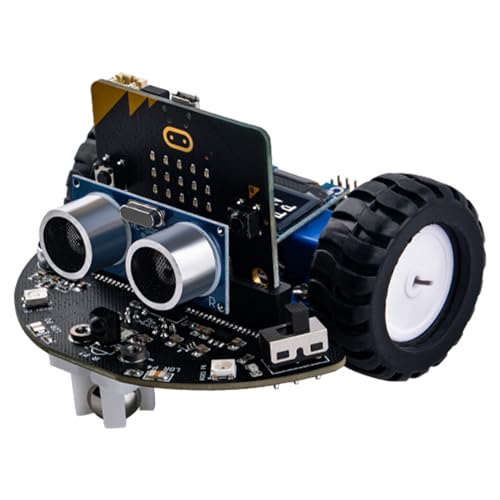
GeeekPi DeskPi MicroCar, BBC Microbit V2.2 Starter Kit,Micro bit DIY Programmable Robot Car Kit,Graphical Makecode Coding Car with Tutorial,for Teens Adults STEM Educational Project,Barebone PCs
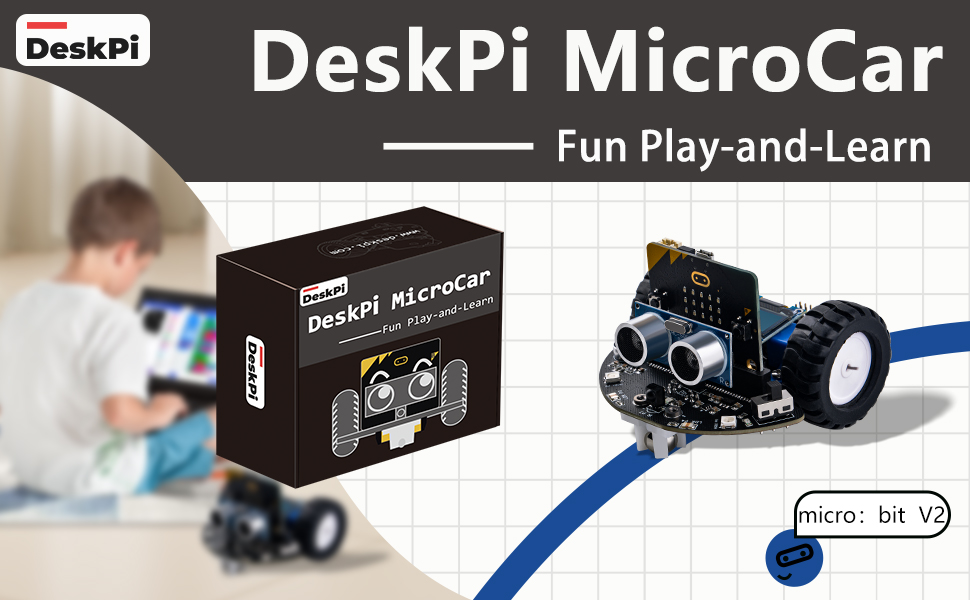
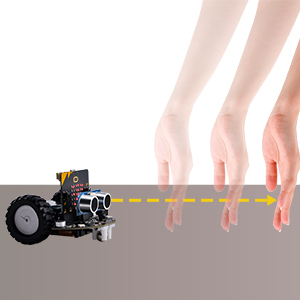
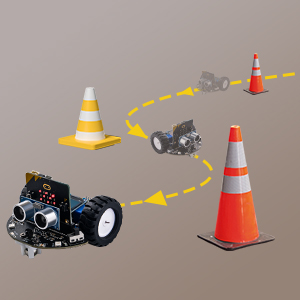
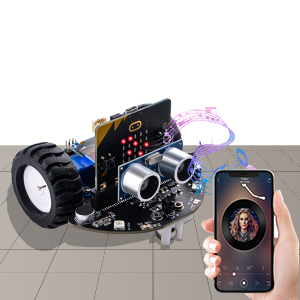

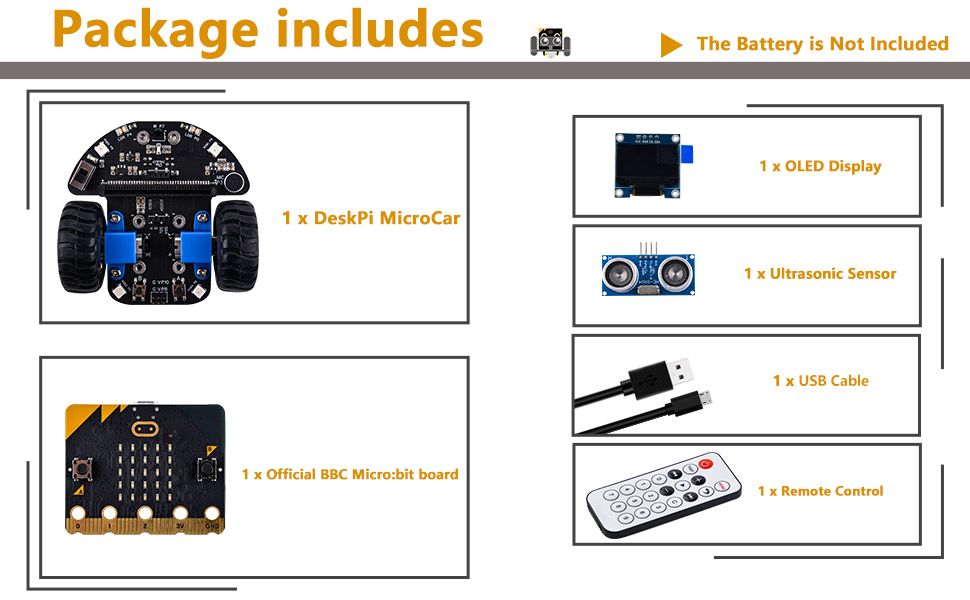
| Weight: | 335 g |
| Dimensions: | 17.5 x 12.5 x 7.8 cm; 335 Grams |
| Brand: | GeeekPi |
| Model: | DP-0023 |
| Batteries Included: | No |
| Manufacture: | GeeekPi |
| Dimensions: | 17.5 x 12.5 x 7.8 cm; 335 Grams |
If you know someone who is interested in programming, micro electronics and engineering etc. but has limited experience, this would make a great gift.
It comes with everything you need including a BBC microbit, ultrasonic sensor and an OLED display all of which makes it quite a good value in my opinion.
You get access to clear and intuitive instructions with drag-and-drop programming making it accessible for most ages. Once together, it is fun and easy to control and is quite a cool little car. I would definitely recommend it.
This micro car is like having a pet robot on my desk – it doesn’t need feeding, just batteries. It’s more than just a gadget; it’s like a mini science project that doesn’t require a lab coat. Ideal for sparking interest in tech, though sometimes it feels like it’s got a mind of its own, especially when I’m still figuring out the controls.
Ce kit est compos d’une carte microbit, d’un cran oled, d’un capteur ultrason et d’un chssis motoris avec des capteurs et des leds.
La programmation se fait via un logiciel (ou via le navigateur) et permet de coder en assemblant des blocs ce qui est trs didactique pour les plus jeunes. La forme des blocs diffrent selon leur fonction et leur nature, pour s’assembler entre eux et crer le programmes.
Pour dbuter on peut commencer par des programmes simples de la carte microbit, puis une fois pris en main on peut l’installer sur le chssis pour profiter des capteurs et leds supplmentaires. Depuis le logiciel du fabricant, on rajoute les lments supplmentaires comme les leds ou l’cran oled depuis les extensions et on accde de nouveaux blocs assembler pour la programmation. C’est bien indiquer sur la documentation qui est malheureusement qu’en anglais.
Les possibilits sont normes et la prise en main est facilit par la programmation en blocs qui rend cela trs accessible pour les enfants.
First Impressions:
Upon receiving the GeeekPi DeskPi MicroCar kit, I was intrigued by its potential for educational and creative purposes. The packaging was compact and well-organized, containing all the essential components for building a programmable robot car.
Setup:
Setting up the DeskPi MicroCar was straightforward, thanks to the clear instructions provided. It’s worth noting that a BBC Micro:bit is required for programming, but it’s not included in the kit. Additionally, the remote control requires a CR2025 battery, which is also not included.
Features and Performance:
The DeskPi MicroCar offers an array of features, including on-board motors, ultrasonic sensors, and graphical programming capabilities through Makecode. While the kit provides a variety of programming blocks for tasks like distance measurement, obstacle avoidance, and line following, I encountered some limitations with responsiveness, especially when using the remote control. Nevertheless, the inclusion of sensors and the ability to customize MIDI sound effects added to the kit’s appeal.
Usability:
The kit’s usability is generally good, but it might require some guidance for beginners, especially in understanding and using the BBC Micro:bit and Makecode. The provided tutorials and online resources help bridge this gap, but non-English speakers may face challenges due to the lack of instructions in their native language.
Conclusion:
The GeeekPi DeskPi MicroCar is a promising educational tool for individuals interested in programming and robotics. Its compact design and rich sensor features make it engaging for both beginners and more experienced users. However, the absence of the BBC Micro:bit and the need for additional batteries could be drawbacks. With the right support and resources, this kit can provide an excellent blend of fun and learning.
This review has been a bit in the making – when I originally ordered the item, the listing was a bit unclear and portions stated “Micro:bit included” and others said “NOT included”. The seller has since clarified this on the listing. There is no Micro:bit included.
In order for me to review the product however, the seller kindly sent a Micro:bit for me to carry out testing.
I’m quite an experienced coder, so was interested to see what these new products marketed towards children were like to work with.
Getting connected to Microsoft MakeCode was easy, and I was able to connect over USB without any issues. Unfortunately in the built-in extensions library, not all functions are available.
I switched over to the recommended software called “Mind+”. It’s downloaded from a very Chinese website with quite a good English translation. After running the software through a virus scanner I proceeded with installation – which again was in Chinese until you switched it over.
In some ways this software is more functional, and in other ways more limited. Using this coding environment I was able to utilise many more of the features on the car – however there seemed to be a limitation when using the Infrared function that you weren’t able to continue using the code-block-UI and had to switch to real code.
I then dug into the user manual, and there was a link to a GitHub repository. This repository seemed to contain examples for Microsoft MakeCode rather than the Mind+ software. I switched back over and was able to get a few more features to work. There were also .hex files included in this repository that you were able to import into Microsoft MakeCode.
I think my biggest criticism is that if Children are intended to use this product, it’s not *quite* user friendly enough to get them started with all functionality.
The biggest positive is that everything seems to be pretty well made. Everything functioned on my board except one of the LEDs which is much dimmer than the others. I have no doubt that the seller would sort this out as they were very responsive.
With a penchant for STEM projects, this mini car kit caught my eye. It was a refreshing mix of challenge and fun. The programming aspect, while new to me, felt intuitive and children could certainly benefit from it. The sensors on the kit added an engaging touch, making it more than just a toy. The detailed tutorial eased the process but still gave room for exploration and learning. For those looking to mix fun and education, it’s a good pick.